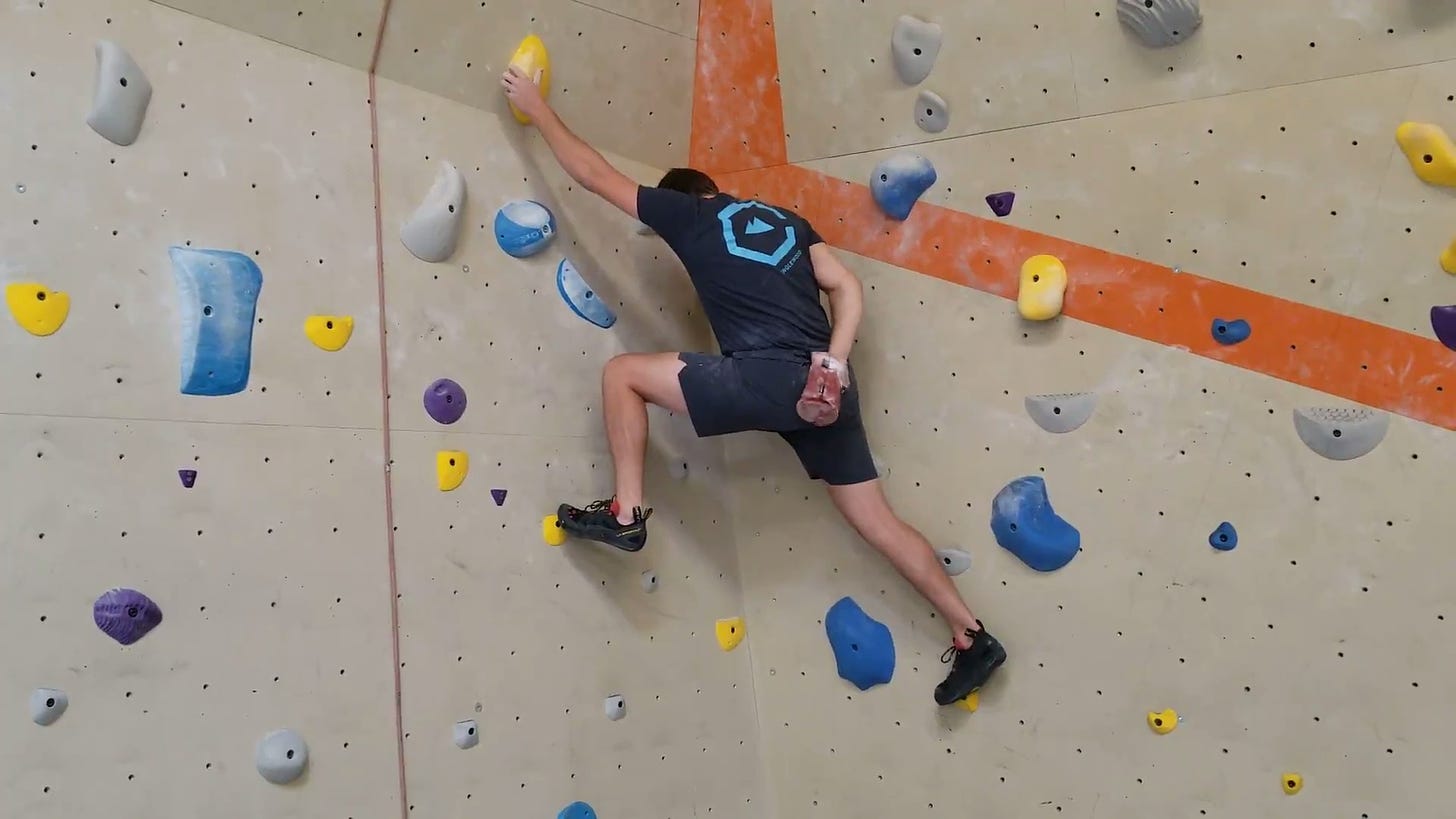The Crux of it all: Overcoming the Aftermath of Success
Why the moments that follow a climactic challenge carry overwhelming weight and pressure, and how we can move past them.
Reaching for the Top
My forearms tingle. I hug the wall as tight as possible, fully engaging my core to reduce the load on my upper body. My left leg is heel-hooked on a sloper almost at chest height. My right foot is wedged into a pocket hold below the ledge, keeping me from sliding back down.
In this strange embrace, the next hold is just out of my reach. Due to its pink color, it looks like a cluster of over-inflated chewing gum bubbles. The pinch hold looks big enough to comfortably fit my hand around. Not ideal for a rest, but something I can grip.
I pull myself tight into the wall, stand up with my back foot, and feel it slip from its secure position. If I don’t grab the hold, I’m going to fall.
My hand slaps the plink plastic in a puff of chalk. Fingers tighten in a firm grip. I made it. Exhausted, but triumphant.
As I pull my lower body over the ledge, my heart sinks: I’m still three moves from the top, and I’m not sure I have the strength to keep going…
Cole’s Climb is supported by readers. Subscriptions are free, help me grow this publication, and make it easier to efficiently provide you with the best content possible.
Bracing for the Hard Part
Every climbing route has its crux — its most difficult move or sequence of moves — along the way. Sometimes it’s at the middle of a route, like an overhang jutting out from the slab you’re ascending. Other times it may be a low start, featuring a tricky dynamic move to get to the next hold.
Arguably the most demoralizing is the crux near the top.
This is the case for a few reasons. Here, you’ll have to complete the hardest moves when you’re at your weakest. It also tends to inspire a fear of dread that quite literally hangs over you. Rushing to meet your challenge faster exacerbates this effect, further taxing your muscles with poor form.
In The Self-Coached Climber, — a fantastic read, by the way — Dan Hague and Douglas Hunter stress the importance of efficiency. This means using good balance and technique to complete moves with as little energy as possible. Through this efficiency, you can arrive at the challenge with the most strength possible.
You can also better prepare by resting beforehand, even if it’s just a brief pause to regain control of your breathing. This isn’t always possible. Sometimes there’s just no good spot to recuperate before a big challenge.
The Aftermath of Success
Set aside the trial of the crux itself for a moment. What’s arguably harder to overcome, is the mental anguish of completing a grueling challenge, only to realize you’re still not at your goal.
As I outlined in the initial example, the handful of moves that follow can feel harder than the crux itself. You want a break after finishing this trial? Too bad, you’re not done yet! It’s not just just demoralizing; it strips us of the satisfaction we should get from our perseverance.
On the other hand, if you take to long to revel in your accomplishment, that’s as far as you’ll go. When every second saps your strength, resting on your accomplishments for too long hurts your chances of reaching the top.
Every challenge you’ve overcome shares one thing in common: despite being a necessary step to getting where you are now, it’s behind you. And you must never confuse a single step with the ultimate goal.
I Want to Hear From You
The psychological balancing act between pressing forward, and giving yourself a well-deserved break permeates all our lives.
What is an accomplishment or crux you’ve had to work past lately? Did it leave you feeling drained? Triumphant? Leave a comment below!





Recently I've realized how much mind of matter impacts our day-to-day. It's important to give ourselves the permission to take breaks when experiencing a difficult circumstance or obstacle, in order to come back and finish even stronger. "You must never confuse a single step with the ultimate goal" --so true. Great read!
Cole, I have to say that I'm not really interested in climbing and didn't think your newsletter would be for me, but after having read several articles I changed my mind. You're a fantastic writer. Your observations and anecdotes make this newsletter worth reading. It's great stuff.